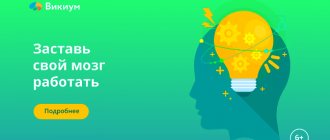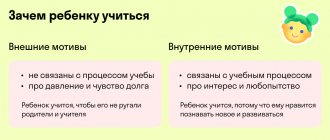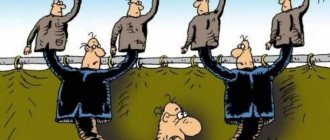How to study effectively. I have rules. I consider them key in this matter. I collected experience through blood, sweat, tears, and calluses on the seat. Now I give it to you. Useful for everyone who cares about self-education and wants growth to continue.
An active specialist usually does not have time to learn and improve skills. But I always try to find time to study. I steal it from other projects or delegate some of the tasks.
There are two reasons:
1. There is competition in any market.
When I stand still, competitors develop. Over time, they will catch up with me, surpass me and take clients or get a project that I could have gotten if I had spent more time on development. 2. I like to study, comprehend new things, understand the essence and dive into the depths of the profession. This is how the brain works: when we learn something new about a topic that interests us, we get pleasure.
I find time to study, even when it seems like there is no time at all. There is no point in waiting for it to appear. Any free time will be filled by a new project, person, or unexpected force majeure.
So. What to do? How to learn and develop effectively? Let's figure it out. Below are 10 rules. Take it and use it.
Stop sifting through free information
There is a lot of information. Available for free. The excuse of lack of knowledge does not work.
Tens of thousands of articles and discussions appear every day. Webinars, conferences, trainings, master classes, books, video tutorials. All this is there and waiting for your attention. But if you are looking for an answer to the question: “how to study effectively,” tons of free information will not help.
The main thing is to learn to filter and choose what is useful right now.
You probably have a folder on your computer that is tens of gigabytes in size, where you dump all the useful stuff, so that you can sort through and learn it later. For example, on vacation. I have one too. It keeps replenished and lives, turning into a trash can. And I no longer feel comfortable opening it. The chaos that reigns in it creates unpleasant sensations. The clutter of useful knowledge has turned the folder into a garbage bin that I will never sort out. I understand this, but I push away thoughts about it.
The information in the folder instead of knowledge and skills creates a feeling of shame.
It is important to accept the fact that when we collect information in a folder, there is no movement. There is only the illusion of movement. Nothing else.
Stop collecting information.
The most common reasons for low academic performance
The most common reasons for low academic performance among schoolchildren are lack of internal discipline, hyperactivity, loss of motivation and simple disorganization. The hardest thing is with motivation: it is difficult to understand how to start doing well in school if you do not understand the meaning of the classes. In second place is the lack of internal discipline, which is inextricably linked with will - it is especially lacking in elementary school students.
Another common reason for poor performance is procrastination. Many students constantly procrastinate and end up trying to do their homework late at night or during recess.
It is difficult to deal with it, but it is possible - it makes sense to create a daily routine and strictly follow it.
As for hyperactivity, this syndrome is easiest to eliminate under the supervision of a psychiatrist. If you don’t know what’s happening to you and why you can’t sit in one place, contact a specialist.
Answer two questions
Before you study, answer two questions. Honestly and without hints.
1. What do you want to learn? What skill do you want to master in the near future? For example, draw logos, layout pages, write articles, tell interesting stories, juggle.
2. Why do you need this knowledge? This question is more important than the first. We don't learn a new skill without a good reason. We need to imagine how we will use the skill when we finish learning. Without this, the skill will be useless and will gradually be forgotten in the palaces of the mind forever. And the time we spent on learning will be wasted.
Examples:
Why do I want to learn how to draw logos? I am a web designer.
The skill of creating logos will help increase your income. Clients ask for this, but I can’t offer a quality result yet. Therefore, I want to gain the skill of creating logos. Why do I want to layout pages? I am a web designer. Clients often ask me to recommend a person who can design a website that I designed. I recommend they go to this person. If I master layout, I can complete one more task for a client, earn more, keep the client and develop relationships with him.
Why do I need to learn how to write articles? I'm a businessman. Now they buy more from those who can talk about the product in a clear and interesting way. This works better than direct advertising. So I want to blog about my products to increase my sales and beat my competitors.
When you know what skill you want to learn, always ask questions:
- Why do I need this skill?
- How will this skill help make my life better?
- What goal am I pursuing?
If it is difficult to answer the questions, then you have chosen the wrong skill. Think about what’s wrong with the choice and weigh everything again.
It happens that we saw someone doing something very well, beautifully, to the applause of the audience. And they wanted to learn how to do the same. And when you try, it turns out to be some kind of crap. Because they made a choice at the peak of emotions. So be sure to ask yourself questions before you start learning.
SPORT
- ride (control a horse);
- play table tennis, billiards;
- jump with a parachute (including theory/practice, and do not just one, but a series of jumps);
- dance a waltz, polonaise, sirtaki - any mass dance or any staged dance - according to video lessons;
- swim generally on your own or well/correctly - with a trainer in the pool;
- do pull-ups “n times” per month: there are different methods. This is what they suggest on the forum: “Today do 5 pull-ups, and tomorrow tell yourself: “I’ll die, but I’ll do 6 pull-ups.” And so every day. The main thing is to set a goal." By the way, in a month you can actually learn to do pull-ups 12-14 times in a row;
- do 100 push-ups in a row;
- change your diet: learn, or rather, wean yourself from eating fast food;
- master classic yoga poses;
- operate a sailboat (quite easy, about 70-100 hours) or a yacht (modern cruising yachts are almost easier to operate than a car with an automatic transmission);
- fly a light aircraft (you can get your private pilot's license after 50 hours in the air with an instructor - it's not as long or expensive as it seems). You can also use Microsoft Flight Simulator - a powerful simulator, it is even used to train real pilots;
- skiing, skating, rollerblading or mountain biking;
- stand confidently on a snowboard;
- learn windsurfing;
- obtain a diver certificate;
- for fun: juggle, walk on your hands, do the splits (increasing the stretch day after day).
K.S. Stanislavsky was once asked:
— How long does it take to stage a performance?
“A year,” answered Konstantin Sergeevich.
- Year? But this is a very long time. Too long.
“Then a week,” Stanislavsky grinned.
Come up with a project to practice a new skill
Come up with a project where you will practice new knowledge and skills. Otherwise everything will be a waste of time. Those who already know how to study effectively do just that.
Let it be a personal project or a project in the company you work for. Check with management.
Just say: “I’m going to learn these skills. I propose to make a project like this, on which I will work them out.” If they refuse, no big deal. Do it yourself.
The project must be challenging but feasible. An easy project does not teach. In easy work, you do what you already know well.
Stability and regularity also do not help to learn new things. It’s good when you are a little nervous and root for the result of each stage: “Won’t your friend succeed?”
To learn new things, go beyond the knowledge and skills you possess.
Scientists conducted an experiment with a group of monkeys. The monkeys completed tasks and received juice for it. Sometimes the chances of getting a treat were stable. But when performing other tasks, receiving a reward was unpredictable. The monkeys didn't know whether they would get the juice this time or not.
While the monkeys performed the tasks, the scientists measured their brain activity. They saw a clear pattern: when the monkeys could predict the frequency of receiving a reward, they turned off the areas of the brain associated with learning new things. And when they could not predict the development of events, the learning centers became more active.
Stability and familiar situations do not help to learn new things. To become better at something, you have to leave your comfort zone and do things that are difficult and sometimes unpleasant.
Come up with a project and break it down into stages. Each stage should have an exercise or action that will help you practice the skill and consolidate it.
General provision
Before you learn any skill, you need to give yourself the best chance of success. You need the right equipment or tools, time, and a willingness to learn. And don't rush. You might even think about how to use unproductive time (comedian and actor Steve Martin, after deciding to learn to play the banjo, placed one in every room of the house, even in the toilet). You must remove all obstacles from the path.
Sometimes it's the right tools that help you overcome the patting/stroking barrier. <…> In street photography, the barrier is the contradiction between the speed of shooting and the unstable position of the camera, which leads to a blurred image. You can overcome the barrier using a small camera that focuses very quickly.
In any case, the "right equipment" means the right one for you. The tools should inspire you to continue training.
Some people are attracted to film photography by the unexpected method of developing it using instant coffee and vitamin C - believe it or not, this composition really works. It may be a little more difficult than using a ready-made developer, but it's fun and unexpected.
When drawing Zen circles, it is very helpful to find a pen that you really like. Artists and illustrators usually have favorite tools. Shu Rayner typically uses Rotring pens, while writer and illustrator Dan Price uses Japanese Sakura markers. I love the Pentel brushes that manga artists use - I think they make drawing Zen circles even more fun.
But general provision does not only mean tools - it also means the environment and those around you. My daughter almost quit playing guitar, but when we changed teachers, she not only began to learn faster, but she became truly interested. The right teacher is very important. He doesn’t have to be a brilliant specialist - but let him make sure that you yourself want to improve in what you like. Just as doctors help the human body heal itself, teachers redirect our attention to help us learn for ourselves.
Find knowledge: paid or free
I always choose paid training and supplement it with free pieces.
I consider spending on training as an investment. I want to receive dividends from each such investment. To get the most out of it, you need to study the material well and hone your skills.
Paid training motivates. When we spend money, responsibility appears: I spent money, now I need to recoup it, otherwise the spending will be in vain. So if you really want to learn how to study effectively, pay for training.
Paid knowledge is usually well structured. It's convenient and effective. There is no need to collect pieces from all over the Internet. Knowledge is acquired faster, more accurately and with better results.
There are moments in every paid course that you want to understand better. To do this, you need to look for additional information. Therefore, I study for a fee and additionally fill in the gaps with free knowledge, which is abundant on the Internet. There is a lot of good free content now. The main thing is to be able to search.
When you have a goal to develop skills, think through a project and choose a source of knowledge: a course, book or training that will help you quickly master the basics. Buy and learn. If in the process you feel that something is missing, get knowledge piece by piece from free sources.
Books
Many books have been written about the ability to learn. And this is very valuable. Read on, dear friends, it’s a light in our gadget darkness.
- Ulrich Boser “How to learn to learn.”
- Waitzkin Josh “The Art of Learning. How to become the best in your business."
- Josh Kaufman “How to quickly learn... anything.”
- Frank Sesno “How to Find Out Everything You Need by Asking the Right Questions.”
- Ron Fry “How to study with excellence? The unique method of Ron Fry."
- Olaf Schewe “Super student. How to learn quickly, effectively and with pleasure.”
- Scott Young "Superlearning"
Start studying
Choose only one course, training or book. Smooth and measured learning is more effective than complete immersion in the abyss of knowledge in which you will drown.
Don't sign up for multiple courses to try to get as much knowledge as possible. Otherwise, you risk not learning anything at all and wasting your time.
On average, training can take from 1 to 5 hours a day. Depending on the format you choose, desire and free time. After all, you probably have other things to do that won’t take care of themselves: work, family, household chores.
Load yourself with knowledge smoothly and in doses.
If you choose 3 courses, spending at least 1 hour a day on each of them, you get 15 hours a week. This is a lot for a working person. In addition, dividing attention into three courses will affect the quality. You won't be able to do every course well enough.
Take only one course and work on only one skill. This will help you learn how to study effectively.
How do parents influence their child's attitude towards learning?
From the very first years of his life, a child forms an attitude towards work based on what he hears from any authoritative adult.
If a teenager sees a negative example in front of him - exhausted parents, tired of endless work and overwhelmed with hated responsibilities - he will not be able to perceive work as an opportunity for self-realization, as an activity that is interesting. A child, like a sponge, absorbs the image he sees. Any positive statement about work, work, study, or how to spend free time shapes his own perception. He begins to understand how to plan and spend his time.
Parents who have never held a book in their hands, but repeat to their child 50 times a day that reading is necessary, do not inspire confidence.
Children act exactly the same as we, the adults who are next to them. You don't have to look far for an example. Even how a child asks questions - and whether he knows how to do it at all - is also taken from the family. Therefore, if a student does not understand a new topic and is embarrassed to ask the teacher again, he is probably unconsciously following the example of his mother or father.
Fit training into your schedule
Learning is a project. It needs to be planned like any work project. Treat it this way, otherwise you'll get sidetracked by another project along the way and won't be able to complete your studies.
Create a training schedule. Plan it out like a monthly project. Make a plan for each week and stick to the plan. Make adjustments if necessary.
If you buy a course, planning is easy. Because after purchase the course program is available. Break it down into weekly blocks and daily steps. The more detailed and accurate, the easier it is to learn and follow the plan.
Now about discipline. Nothing will work without her.
There is an option to watch all the lectures of a course that lasts several months over two weekends. You can ignore homework, exercises and the final assignment. This option helps save time, but kills efficiency, because the main thing in learning is practice and completing tasks.
A skill is formed when we act, practice knowledge, and implement it in our work.
To get the best effect from learning, break the knowledge into doses and take small portions daily. It’s important to not just read and watch something every day. It is important to translate knowledge into work in order to capture the skill.
If studying every day is difficult, try three times a week. The main thing is to set up regularity.
There are categories of people who study infrequently. It's more difficult this way. Their brains are not used to learning. At first there is discomfort. Laziness and procrastination periodically visit. But gradually they begin to enjoy the process and want to learn more, better, more attentively. There will be a desire to improve other skills.
Brain exercises
At first glance, the connection between sports and good academic performance is not obvious - in modern culture, “a typical excellent student” and physical activity are rather antonyms (remember how Sheldon played basketball).
In fact, physical exercise is one of the factors that improves cognitive abilities, which has also been confirmed by a number of scientific works. For example, one of the studies on this issue confirms the connection between physical exercise and improved memory. The researchers analyzed the performance of 120 people and noted a connection between regular aerobic training, an increase in the size of the hippocampus and (as a result) an improvement in the subjects' spatial memory.
Another benefit of exercise is that it helps combat stress. The American Psychological Association, for example, notes that one of the advantages of regular exercise is the strengthening of the relationships between physiological systems (muscular, cardiovascular, nervous system), which are excited in an emergency situation. During training, the body “works out” the standard reaction to stress, as a result, “in combat conditions” we are able to control ourselves better, since during training the body has already “learned” to work with such conditions.
In 2012, the journal Brain Research published a meta-analysis of materials on the connection between exercise and brain function. The result, however, was not particularly impressive - based on the analysis of 79 scientific materials, scientists noted that the connection between the two phenomena (physical activity and improvement of cognitive abilities) does exist, but is quite weak. True, scientists do not deny that a more significant effect is possible and depends on what specific results of cognitive activity are recorded by the researcher during the experiment.
Weightlifting or CrossFit may not be the best options for getting started in the world of sports; if your goal is to improve your health and brain function, even moderate physical activity will do. For example, the World Health Organization advises doing about 150 minutes of moderate-intensity physical activity per week—enough to help your brain, start improving your health, and still not give up on your studies.
If you’re not used to it and don’t want to learn
You need to form a habit. Studying is a great habit.
Study materials for 5-10 minutes a day. If after 5 minutes the process goes well and you want to continue, continue. If you don’t want to continue, don’t continue, do other things, and try again tomorrow.
Usually everything goes well and after 5 minutes you want to continue. If not, there is something wrong with the target. You don’t know why you are doing this and you don’t feel the meaning of knowledge. In this case, return to the questions from the second paragraph of the article.
If you have a lot to do during the day, study in the morning, because work takes all your energy and you are lazy to study in the evening. Take 30 minutes and spend that time immersing yourself in learning. It's enough. It's okay that it's slow. The main thing is that you take action.
Need more water
Another fairly common piece of advice is to avoid overdoing it on caffeine, but still drink enough water.
This recommendation has well-founded scientific confirmation - research in this area has been going on for quite some time. For example, during one of the experiments (a scientific publication based on its results was published back in 1988), it was shown that even slight dehydration (1-2%) can cause a decline in cognitive abilities. The study, in particular, noted a deterioration in short-term memory and the ability to solve arithmetic problems. And the authors of a more recent publication in the European Journal of Clinical Nutrition state that “dehydration is a prerequisite for cognitive decline.” So, to stay focused while studying, keep an eye on how you feel and stay thirsty—especially if you're actively exercising in addition to studying.
Photo by ITMO University
Immediately implement
Immediately implement all the knowledge you gain during the learning process into your work or life. This way you will get maximum results. It is for this reason that in point 3 you came up with a project on which you want to practice new knowledge. Introduce them into this project.
It happens that at some point during the learning process the concentration of knowledge is too great, and it is impossible to implement everything at once into the project. Or the project is still at the stage of implementing the knowledge that you received in the last week of training. And without this, it will not be possible to introduce new knowledge. And you will not be able to find your answer to the question: How to study effectively.
In this case, instead of implementing immediately, plan to implement it in the future. Determine what steps you need to take next and make a plan. This way, even after completing your studies, you will know what to do next so that the time invested in your studies is not wasted.
Every course or book may have gaps. This is fine. The author of the course relies on personal experience. He can't make a course that suits everyone. Therefore, there is almost always a moment when the knowledge from the course is not enough to solve the problem. In this case, you need to obtain knowledge from other sources in order to still get a complete picture to solve the problem. Sometimes it’s better to write directly to the author of the course so that he can help you figure it out and provide links to additional materials. He will find them faster because he is in the know.
And, of course, the Internet can help you. Information has no boundaries. He who seeks finds.
Benefits of educational institutions
So, in order to do something well, you need to bring it to automaticity. We automate the skills of writing, counting, and correct speech in educational institutions. Kindergartens, schools, universities help us with exactly this. For which we thank them.
Special respect to universities. After all, the curriculum for kindergarten and elementary school can be worked out at home, if you really want to: you can learn to read, write and count simply with an older person. And note, by the way: who is more successful in school? The one who brought these 3 skills to automaticity!
But the program of universities, academies, and colleges helps you go through the pain of mistakes and repeated repetitions in order to achieve professional skills. For example, to learn how to give injections correctly, a nurse needs to train on mannequins and people. Only after several hematomas (God grant that without them) will she become more experienced.
I believe that all educational institutions have a huge advantage - they teach us the ability to learn.
Show result
Try to demonstrate the result.
If you don’t show it, you can’t prove it. We learn to become better for ourselves and others. But others won't know anything about our skills unless they see the results. Therefore, there should be a place on the Internet where you put evidence of your skills and knowledge.
A portfolio is a great solution for this.
There are many sites where you can make an excellent portfolio without knowledge of programming languages, which is interesting and enjoyable to study. Some of them:
- nethouse.ru
- wix.com
- carrd.co
- tilda.cc
- imcreator.com
Another great option is to blog about your work and gather an audience, some of whom will become your clients. But it takes much longer. If you have it, go for it.
Private schools
Private schools often differ from public schools in the form of education. There they can abandon assessments, take into account the individual needs of children and use new educational methods.
If a private school has been accredited, it is equal to a state school. That is, it is guided by federal state educational standards (FSES) and can issue state-issued certificates. You can check whether the school you choose has accreditation in the Register of Educational Organizations.
Schools without accreditation can also teach children if they have a license issued by Rosobrnadzor. But intermediate and final certifications will have to be taken at a government agency.
Education at a private school is paid. But management takes care of the infrastructure on its own. And in private schools there are often fewer students in a class than in public schools, so it is easier to take into account the characteristics of each.
Daria Akhtyrko, graduate of the Saratov State Law Academy, lawyer
A private school must have a package of documents:
1. License for the right to carry out educational activities.
2. Medical license. To monitor the health of children, there must be a medical office.
3. Accreditation of an educational institution. If an institution has just opened, it can receive accreditation only after five years of operation. Before this, you will have to take exams at government institutions at your place of residence.
4. Certification of teachers. Teachers are required to confirm their qualifications every five years. It is important that teachers have a diploma and a medical book.
5. Charter, which defines the principles and rules of operation of the educational institution.
6. Documents with the right to use the premises in which the school is located. If the building is leased, there is a risk that over time the school will have to move to another area or close. If the building is the property of the school, there are fewer risks.
How to choose a private school
- Check availability of necessary documents, licenses and accreditations. If there is no accreditation, find out how intermediate and final certifications are organized.
- Find out what is included in the price. Do I need to pay extra for food, clubs, and summer months? This will help you more accurately calculate the actual price.
- Research the school's reputation. Look for reviews on the Internet. Talk to students' parents. Keep track of where graduates go.
Celebrate mistakes
Life is a training. When you treat her that way, everything becomes easier. Make mistakes, try again, look for answers, make mistakes again and try again.
Mistakes are inevitable. This is a useful part of the process. It is normal to make mistakes in any training. If the project fails or doesn't turn out the way you planned, that's okay. The main thing is that you learn new things.
Hope. my rules will help you formulate your answer to the question: how to study effectively. Take action. Good luck.
Is it possible to develop motivation?
Alas, modern psychology claims that it is impossible to form the notorious motive from the outside. Each person must do this himself. Teachers and parents can only facilitate this process or, conversely, hinder it, which, unfortunately, happens much more often.
There are a number of theories, sometimes paradoxical, about ways to increase internal motivation in the educational process. Sometimes these methods are quite controversial, sometimes they are simply not applicable to the real situation. Therefore, we will limit ourselves to a few practical tips:
- Try to set the student up for a positive result. If your son regularly makes 15-20 mistakes in dictations, but only 10 were found in the last one, praise him for it! There is a small but success.
- Don't make him promise to do the next task perfectly. Such a task is impossible!
- Punishment for bad grades (spanking, deprivation of walks) never brought any benefit. It, as well as phrases like: “Homework must be done by five o’clock!” can only be used when you know for sure that your son or daughter was fooling around instead of doing his homework. If a child spends three hours studying textbooks instead of the required two, praise him: he is interested, he is trying.
- Do not rush to offer your help when completing tasks. Do this only when you see that the child himself cannot cope.
- Do not overdo it with prizes and awards for academic success. The main prize should remain the knowledge itself!
- Be careful in competitive situations. (There are only three prize places, and there are 25 people in the class!) It is better to teach your child to analyze and compare their own results and achievements.
- Do not impose a goal on your child from the outside. In this case, its achievement will be necessary for you, not for him! Enroll your children in clubs and developmental sections. Try to identify their own interests. Even if all your life you have dreamed of seeing your daughter become a mathematician, but what she loves most is cross stitch. It’s better to accept: she won’t make Sofia Kovalevskaya, but perhaps Coco Chanel will.
- Try to identify an element of intrigue and mystery in the tasks. “Entertaining Mathematics”, “Problem Book” by G. Oster, all kinds of puzzles and puns, stories about travel and great discoveries will help to captivate your child with school subjects.
Advertising
You must have a goal
First of all, to master a skill, you need to understand why you need it.
If you want to master English, then the goal in itself of “learning English” is rather vague. Be more specific: “I want to learn English to the level where I can read books and watch TV shows without translation.”
This approach speeds up learning and makes it goal-oriented. Instead of learning everything, you open books, try to read them and learn what you don’t understand.
Your training progresses by leaps and bounds and consists of practically applicable skills. Every bit of information received on the way to your goal is worth its weight in gold. This cannot be compared with the traditional approach to learning, where a university teacher gives you a lecture for half an hour, but only five minutes of valuable information in it.
You choose what to remember for yourself and what you really need to master. You can take revenge for the useless school years, where you sat in class and scratched your turnips, repeating: “Why the hell do I need this?!”
In our case, you will know for sure why the hell you need it, because every action you take brings you closer to success. You will enjoy self-learning and it will bear fruit.
Be patient
Every day, trillions of dollars travel around the world, leaving some and returning to others. What resource never returns to anyone? That's right, time.
Time can be your best ally or your worst enemy - it all depends on how you use it.
We all have 24 hours in a day. Saying you don't have time is the easy way out. We all don't have time.
If you really want to succeed, you will find the time and opportunity.
Patience is the price the winner pays. When the loser gives up and goes to watch the series, the winner continues to be left with the problem - that’s the whole difference between them.
To sum it up, I will say that you can learn everything on your own. Do it your way and no one will stop you.
You can achieve anything if you believe in it and persevere.
See you later.
Vlad Makeev.
- Repost
- Repost
- Retweet
The article is dedicated to all those who:
- still can’t sleep after seeing the pattern diagram from the Gang of Four book Scary thing
- confused by the number of pages in technical literature
- always afraid that everything he read will be lost in the back of his mind
- still re-reads countless notes
- I am sure that once you understand the topic, you have studied and remembered it
- confident in my knowledge, although there is no reason for it
- wants to learn more about effective
ways to learn new things and, most importantly, remember new things.











